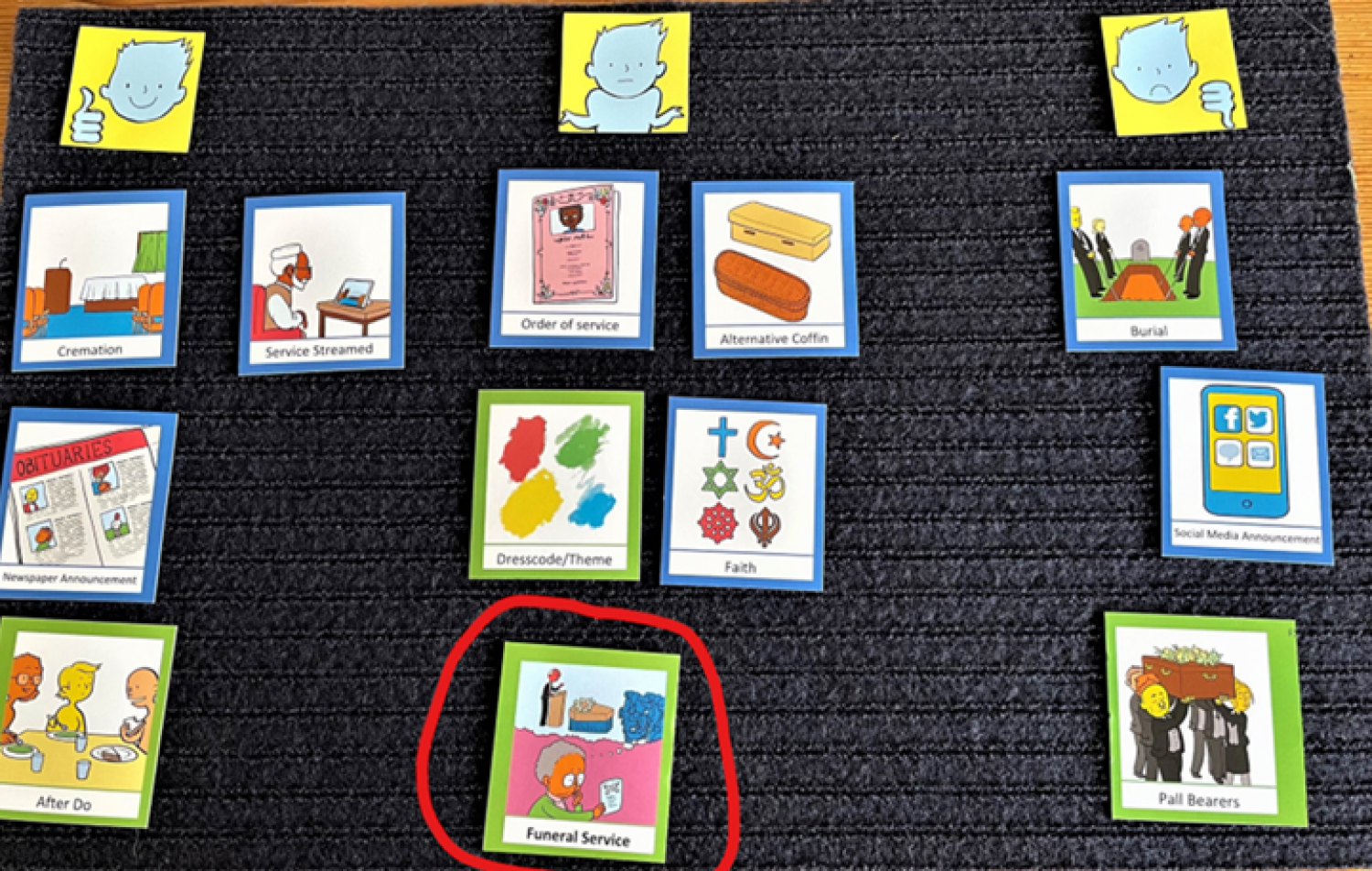Four minute read
Gillian Robertson is a funeral celebrant and the retired headteacher of a special educational school. She talked to us about why she’s so passionate about involving people with communication difficulties in funeral planning.
“As a celebrant, I was asked to do a gentleman’s funeral,” recalls Gillian. “He had two daughters, one of whom had additional support needs. When planning his funeral, I spoke mainly to her sister and her mum. They had decided not to tell the other sister the date of the funeral.
"I had a stomach-churning feeling, this didn’t seem right, but it was not my decision. I had no materials I could offer the family to help make sure their sister was included.
“It came to the day of the service. To my surprise, the sister was there with her support worker. I had a nice chat with her at the start. During the service, she got up, turned to the coffin, and waved goodbye to her dad.
"I think her mum and sister were embarrassed, but I was so glad she didn't miss the chance to be able to say goodbye or get that closure that other people get from a funeral.
“I reflected back on my time in teaching. Often children would come into school on family funeral days instead of attending. It was done for the best of intentions, wanting to protect them or out of a fear it would be too upsetting. I never thought to challenge it until now."
How can you support someone with communication difficulties to plan a funeral?
“I started thinking, what is there out there? How could you support someone with communication difficulties to be involved in the process of planning a funeral? I found some resources but they were very childish. Then I remembered Talking Mats.”
Talking Mats is an evidence-based visual communication framework. It aims to improve the lives of people with communication difficulties by increasing their capacity to think about and express views about things that matter to them. This includes topics like care arrangements, personal safety or mental health.
A Talking Mat session is based around a side-by-side conversation. A Listener, a trained Talking Mats practitioner, sits alongside the Thinker and asks them open questions.
The Thinker answers by placing a card with a picture on it in an area on the mat which reflects their view. The Thinker has complete control to give their opinion, to say what they like, don’t like or aren’t sure about.
At the end of the conversation, the Listener checks whether the Thinker wants to change or add anything, and takes a photo of the mat as a record. Nothing needs remembering or writing up in words.
Resources for challenging conversations
An effective Talking Mat needs a structure that supports the conversation you want to have. Developing this structure requires time, effort and many different perspectives.
Funding from the Big Lottery meant that Gillian and staff from Talking Mats could set up two focus groups — one for celebrants and funeral staff, the other for people with learning disabilities and their support workers.
The groups discussed, adapted and tested the structure for the conversation. Three topics emerged — funeral planning, the funeral service and the eulogy. Next, symbols were designed, tested and adapted in response to feedback. The resource is currently on its final testing phase and will be available from Talking Mats in May.
“The funeral arranger in the focus group has a daughter with additional support needs. She was over the table with excitement,” says Gillian. “She shared my passion to get as many people involved as possible.
“I spoke to lots more people after that — a soul midwife working with someone who had lost her speech due to cancer; a speech and language therapist, supporting someone in the early stages of dementia. This went far beyond my experience with people with learning disabilities to a much wider field.
“We tested the new set of cards with support staff who are already trained in using Talking Mats for challenging conversations. They said that they found the set helpful for themselves and their own reflection.”
Everyone deserves to have a voice
Talking Mats will help more people with communication difficulties play an active role in funeral planning, but Gillian is convinced that change needs to go much deeper.
“The values behind Talking Mats are about making sure that everyone has a voice. If we deny people the ability to be heard, we deny them their human rights. When people’s voices are heard, improvements in their lives can be made.
“This is a contribution to being able to talk about death and dying more comfortably — we know how difficult this is as a society! And it’s about raising awareness among funeral directors and celebrants.
"They may assume that someone with learning disabilities or communication difficulties is not able to understand or contribute to funeral planning, but everyone deserves this opportunity, and everyone deserves to have the right support available.”
Watch this short explainer video to find out more about Talking Mats.
Read more blogs from Poppy's — Why we don't use euphemisms or Funeral rituals for people with and without learning disabilities.
